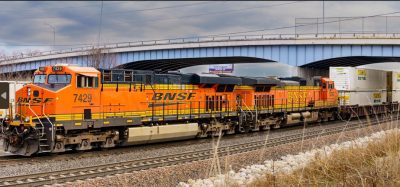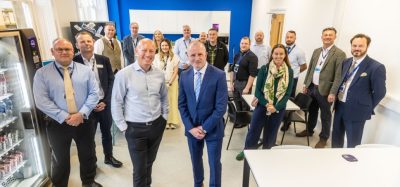TOCs Management Series: Q&A with Tom Moran, MD, Thameslink and Great Northern
Posted: 4 June 2020 | Tom Moran | No comments yet
In the first instalment of our Train Operating Companies (TOCs) Management Series, Tom Moran, Managing Director of Thameslink and Great Northern – part of the Govia Thameslink Railway (GTR) franchise – discusses how he plans to steer the business through the next phases of the COVID-19 crisis, the importance of maintaining standards across the network to benefit passengers, and how providing opportunities for the next generation of employees is a core company value.
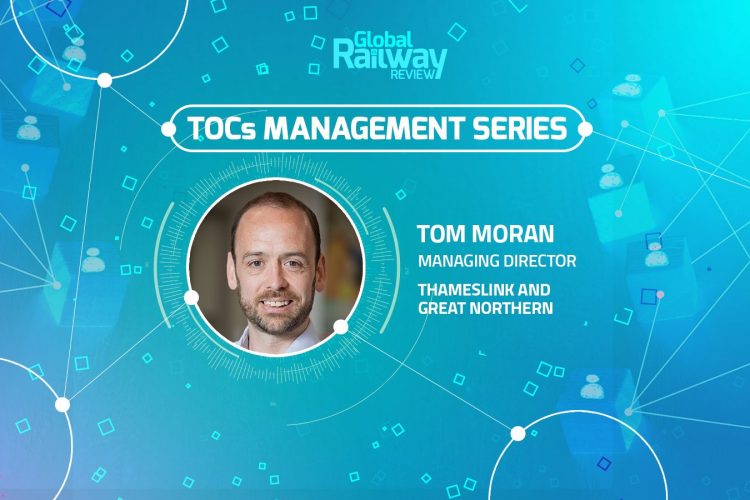

What would you say has been your toughest challenge since starting your current position and how did you overcome it?
Without question, the ongoing COVID-19 pandemic has been the toughest challenge I’ve faced since joining Govia Thameslink Railway (GTR). Of course, we have plenty of other challenges – we are steadily winning back the trust of our passengers and restoring the faith of our stakeholders and we want GTR to be seen as the best and most successful rail franchise in the UK.
Mitigating the risks of COVID-19 is no easy feat, nor is winning passenger trust. However, by relentlessly focusing on the basics, trusting our people, ensuring colleagues know they can trust management and giving staff regular briefings on the real facts from the top down, we are finding positive solutions. One example of this has been how we’ve used Yammer to engage with colleagues, answering any questions quickly and directly.
Without question, the ongoing COVID-19 pandemic has been the toughest challenge I’ve faced since joining GTR.
Earlier in 2020, we refreshed our brand identity to ‘We’re With You’, further emphasising that staff and passengers are at the heart of the business. This helped us to better acknowledge our people’s home lives and commitments and support them as best we can. This has gone one step further now; I have to manage home schooling my children alongside my career and, as with all our staff, there needs to be some flexibility and understanding. Overcoming the challenges we faced could not have been achieved by one person, but by the many teams across GTR; we have 7,500 people doing very important jobs whilst supporting their colleagues, families and communities.
What are you doing to make sure your passengers are happy with their on-board and overall travel experience?
Having come from the postal industry, known for its customer-focused approach, it’s an ambition of mine to invigorate this way of thinking across the rail industry. Something I believe we have made huge strides in at GTR.
Improving passenger experiences is all about mindset. When making any decision – and this applies to all staff across the business – the first consideration is always what impact a change we make will have on our customers and their experiences with GTR.
Furthermore, by setting a good example and high standard, our passengers will come to expect the best possible service whilst travelling with GTR. One of the first stations I visited was particularly run down and this became the priority for me. If it isn’t good enough for us, it isn’t good enough for our passengers.
By setting a good example and high standard, our passengers will come to expect the best possible service whilst travelling with GTR.
To ensure standards are maintained across the network, our Passenger Benefit Fund (PBF) is being used to improve our stations and the wider network by making practical changes. While the practical work is on hold due to COVID-19, planning continues for these projects; these include a range of updates, from refurbishing toilets and building bike racks to brightening up stations with artwork and murals. Through customer responses and a consultation process, we understand our passengers’ needs and demands and make decisions we know will improve their experiences. For example, in 2019, we invested £240 million on trains for the Great Northern line, replacing some of our oldest trains with the newest, equipped with Wi-Fi and air conditioning, as requested by our passengers.
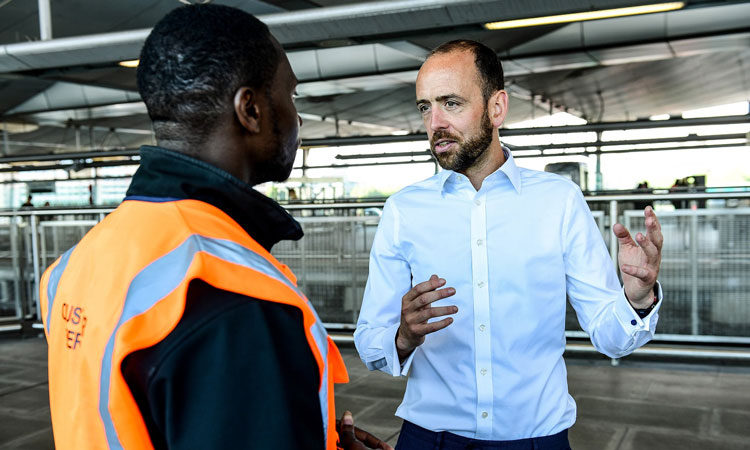

“Our staff know that they can raise any concern and it will always be listened to and addressed.” – Tom Moran, Managing Director, Thameslink and Great Northern.
How are you working to improve train performance and punctuality in the future?
I like to keep things simple and, in simple terms, there are four reasons why a train might be late or cancelled: issues with the track, trespassing, train faults and a driver not being available. We address each cause with its own strategy in order to achieve the best solution in the fastest time.
To minimise the impact of track issues on our services, we work very closely with Network Rail, who are responsible for monitoring and addressing signal failures and other track related issues. In doing so, we are able to isolate incidents and invest in improvements, helping to decrease the number of faults.
To reduce the number of suicides and attempted suicides, we have an expertly trained suicide prevention team, ‘caring for the vulnerable’ initiatives and dedicated welfare officers who work closely with police. As a result of our staff’s incredible efforts, the number of interventions has gone up just as the number of suicides has gone down. We personally thank each team member who has saved a life at our regular GTR Lifesaver Awards.
To minimise the impact of track issues on our services, we work very closely with Network Rail…in doing so, we are able to isolate incidents and invest in improvements, helping to decrease the number of faults.
To restrict other forms of trespassing, our stations and platforms are equipped with CCTV and motion sensors, so that we can take immediate action when required and minimise the number of incidents.
Train improvements are often a question of investment, and something we at GTR have not shied away from. In 2019, we completed what is thought to be the biggest rolling stock cascade ever; investing £2 billion over five years, turning one of the UK’s oldest fleets into the most modern.
Having enough trained drivers has been an issue in the past, but we have made huge strides over the last year – we’ve recruited and trained lots of drivers and I’m pleased to say that, in doing so, we’ve also been able to attract significantly more female drivers than we have in the past.
How important is transparency to your organisation; do you think you can do more in this respect?
Transparency is vital; without it, you simply can’t run a business effectively or safely. Our staff know that they can raise any concern and it will always be listened to and addressed. All colleagues have a 100 per cent commitment from the top down that we, as a leadership team, will do everything we can to deal with their concerns – they usually know more about how to fix things than we do!
There is always more to be done, and a big part of this is leading by example. I spend a lot of time out and about at depots and stations – often more time than I do in the office – working alongside colleagues from around the business.
To what extent would you say GTR is a modern and forward-thinking business?
We’re very forward-thinking, but not necessarily very modern. This business, more than any other I’ve worked for, is truly committed to understanding its staff and learning from other industries in how it can improve.
This also applies to technology and how we’re using it to influence decision making processes by better communicating with passengers, as well as make more effective improvements to the business, like service punctuality, by using data management.
Our response to COVID-19 is a good example of being a forward-thinking business. We’ve been tracking COVID-19-related sick-leave to better understand where there are absences. It has completely transformed how we manage staff and ensures that every team has the appropriate capacity and support.
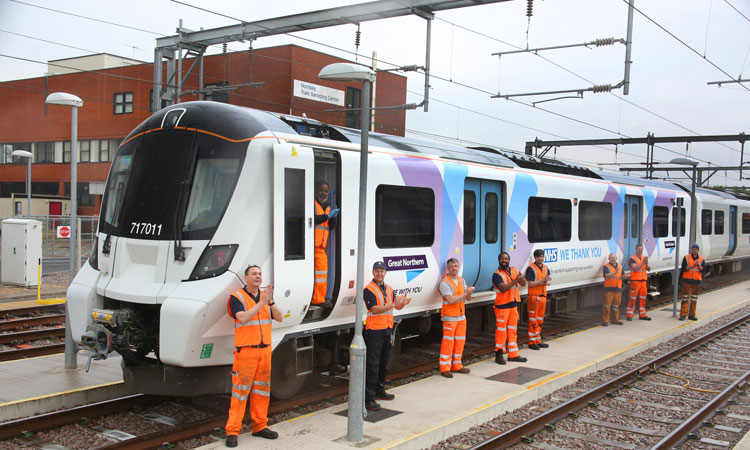

Govia Thameslink Railway (GTR) re-branded three of its trains in new livery to pay homage to the 200,000 NHS and key workers that travel on its network each week.
What training and development opportunities do you offer your employees, and how are you attracting the next generation to build a career with you?
With the time afforded to us, we re-purposed our staff Development Hub – an online services platform previously targeted at management – and made a really exciting change. The hub and its services are now available to all staff, giving everyone equal access and opportunity to further develop their skills.
Providing opportunities for the next generation is a core company value at GTR and something we’re immensely proud of, with apprenticeships available across 14 roles within the company.
As aforementioned, providing opportunities for the next generation is a core company value at GTR and something we’re immensely proud of, with apprenticeships available across 14 roles within the company.
However, it’s not just about the next generation, but also encouraging more women to actively seek careers in the rail industry. In 2019, 29 per cent of GTR’s trainee drivers were women, up from 18 per cent in 2018, and it is our ambition to increase this figure to 40 per cent by 2021.
Which other TOC do you personally admire, and why?
LNER, and there’s two key reasons for that. Everyone has their nostalgic, home county line – for me, I grew up in York and would usually use a LNER service from York to London King’s Cross. But, more than this, David Horne is someone I really respect. He’s honest, straight forward and the way he leads his business is brilliant.
All TOCs can do better; what would you say GTR must improve on the most?
While we are definitely going in the right direction, there is still much more we can do to empower our front-line colleagues to do the right thing for our customers.
What priorities are you focused on delivering over the coming months?
The most important thing I need to focus on is steering our business through the next phases of the COVID-19 crisis.
There are lots of practical improvements, such as introducing our new digital signalling system; doubling the capacity for our passengers in Cambridgeshire and Norfolk by introducing eight-carriage trains; and improving every single station across the GTR network through the Passenger Benefit Fund works and initiatives. But the most important thing I need to focus on is steering our business through the next phases of the COVID-19 crisis, making sure we keep our passengers and our colleagues safe. If we can do that, and I’m sure we will, then we can do anything!
If you would like to take part in Global Railway Review’s TOCs Management Series, or would like to nominate a colleague to part, please email: Craig Waters, Editor, Global Railway Review.
Related topics
Coronavirus/COVID-19, Operational Performance, Passenger Experience/Satisfaction, The Workforce, Women in Rail
Related organisations
Govia Thameslink Railway (GTR), Great Northern, London North Eastern Railway (LNER), Thameslink



